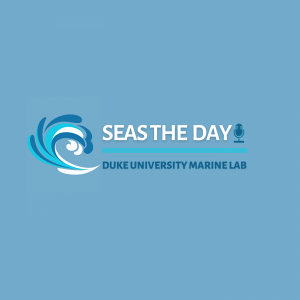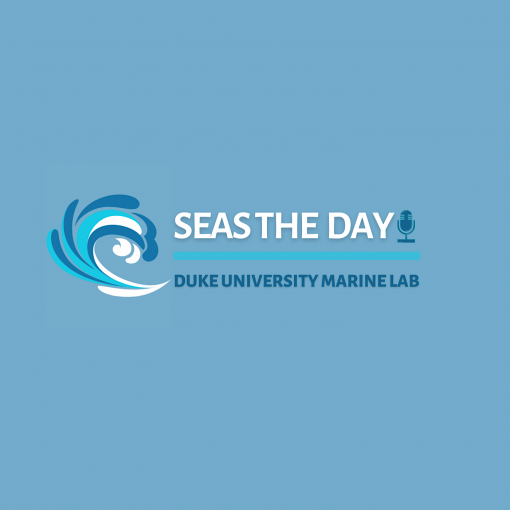On this episode Rand Alotaibi, Lauren Mahoney, and Madena Mustafa talk about the negative impact that noise from ships and seismic surveys has on whales, with a special focus on the blue whale, the largest animal to ever live. Rand, Lauren, and Madena consult marine mammal experts to learn why sound in the ocean is such a big deal, and to identify what we can do to help.
Listen Now
Episode Hosts
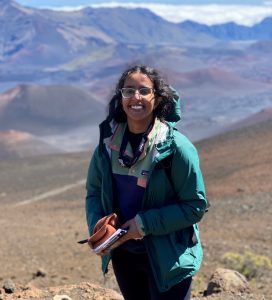
Rand Alotaibi is a senior at Duke University majoring in Earth and Ocean Sciences with a certificate in Documentary Studies. She hopes to use storytelling to communicate science and connect people with nature.
Twitter: @alotaibirand
Lauren Mahoney
Madena Mustafa
Interviewees
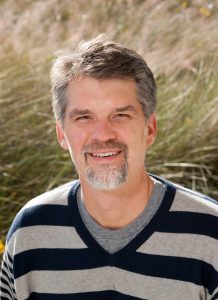
Doug Nowacek, Randolph K. Repass and Sally Christine-Rodgers University Distinguished Professor of Conservation Technology in Environment and Engineering in the Nicholas School of the Environment
Dr. Nowacek is a professor at Duke University’s Nicholas School of the Environment and is the head of the Nowacek Bioacoustics and Engineering Lab. He specializes in cetacean bioacoustics and foraging behavior whilst also focusing on the effects of anthropogenic noise on marine mammals and potential ways to mitigate these issues.
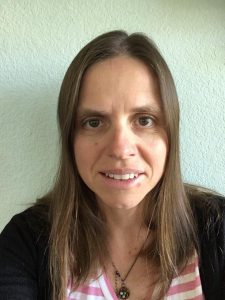
Nicola Quick, Ph.D.
Dr. Quick is a Research Scientist within the Read Lab at the Duke Marine Lab. Her professional experience spans both academic and commercial sectors where she has primarily been involved with projects concerning the acoustic behavior of marine mammals and the effects of anthropogenic noise on cetaceans.
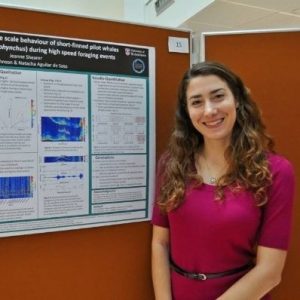
Shearer is a Ph.D. student at the Nicholas School of the Environment pursuing a degree in Ecology. As a student, Shearer is advised by Andy Read in the Read Lab that primarily focuses on conservation biology. Her dissertation work aims to examine the fine-scale kinematics of foraging in three cetacean species.
Series Host
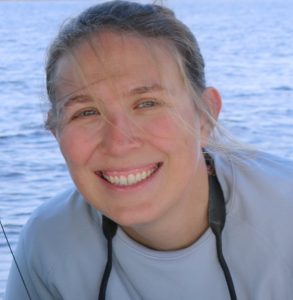
Dr. Reny Tyson Moore host the Whale Pod series. She is a broadly trained interdisciplinary behavioral ecologist with expertise in marine mammal bioacoustics, photographic-identification, population biology, and bio-logging tools and techniques. She is currently a staff scientist with Chicago Zoological Society’s Sarasota Dolphin Research Program and a contractor for NOAA Fisheries Office of Protected Resources through Ocean Associates Inc. Reny received her PhD from Duke University in Marine Science and Conservation, where she used high-resolution acoustic and movement tags to study the fine-scale foraging behaviors of humpback whales along the Antarctic Western Peninsula. Before this, Reny obtained her BSc and MSc from Florida State University where she examined nonlinearites in cetacean vocalizations and determined the abundance and community structure of bottlenose dolphins in the Big Bend of Florida. She went on to apply her skills as a Postdoctoral Research Fellow and Scientific Committee of Antarctic Science Fellow at the Institute for Marine and Antarctic Science, based at the University of Tasmania in Hobart, Australia, and then as a postdoctoral scientist with the Chicago Zoological Society’s Sarasota Dolphin Research Program. Reny has published or been a co-author on many peer- reviewed scientific articles, technical reports, conference papers, children’s books, and conference and workshop presentations. She also serves as a mentor and teacher for undergraduate and graduate students at various institutions, including the Duke University Marine Lab.

Supplemental material for this episode
“Oyster Waltz” by Joe Morton plays
Reny Tyson Moore: Hey there, and welcome to Seas the Day, a podcast from the Duke University Marine Lab. My name is Reny Tyson Moore and I will be your host for today as we bring you the third episode from our Whale Pod Series. If you have listened to our series before you may remember that these episodes are produced by students attending the summer session of the Marine Mammal Science and Conservation course that I teach through the Duke University Marine Lab. In just six short weeks the students choose a marine mammal conservation or management issue as the focus of their episode, find and interview experts in marine mammal science about their chosen topic, and then draft, edit and produce the podcast episodes all while also attending to other assignments, readings, field trips and lectures as well as any other fun summer plans or responsibilities they may have. For me this assignment was a bit of an experiment. I was tired of having students work so hard all summer just to write a term paper that in the end would really only be read by me. I’ve always enjoyed podcasts so had the idea that a podcast could be a fun way for the students to both demonstrate what they learned through the course, but also share what they learned about these species and communicate the issues surrounding their conservation with a broader audience – a skill that is so very important in marine mammal science and conservation. In addition, with everything going virtual this summer thanks to the COVID-19 pandemic, I thought that this may be just the perfect opportunity for students to connect virtually with experts in marine mammalogy from around the world that we would not normally get to interact with. I have to say – I am very happy with the results and I am even happier that we get to share them here with you today as part of the Whale Pod series on Seas the Day. This week’s episode focuses on man-made sound in the ocean and how it affects marine mammals, including the largest animal to have ever lived on earth – the blue whale. It was produced in the summer of 2020 by Duke undergraduate students Rand Alotaibi, Lauren Mahoney, and Madena Mustafa. In this episode, the students speak with Jeanne Shearer, Nicola Quick, and Doug Nowacek, scientists from the Duke University Marine Lab, about this issue and explore the different ways scientists, such as those at Duke, are working to study the effects of sound on marine mammals. We hope you enjoy this week’s installment of Seas the Day – Whale Pod style.
Rand: In today’s episode we will be focusing on the largest animal ever known to live on Earth, the Blue Whale, otherwise known as Balaenoptera musculus. Current predictions of the world’s stock lie at an estimated 10,000-25,000 total whales. They can be found in all major oceans other than the Arctic – seasonally migrating great distances between summer feeding grounds in the poles and winter breeding grounds near the equator. But with such a wide range and dispersal, can come extreme difficulties in planning and successfully conducting conservation efforts for these whales.
Lauren: These gigantic marine mammals weigh in at 441,000 pounds and have been recorded at lengths of over 100 feet long. Because of their size and stature, one would think that these gentle giants are nearly invincible. And for roughly 4.5 million years, Blue Whales were able to roam the oceans relatively unharmed. But as human developments started to grow, blue whales began to face potentially lethal disruption from human activity. At the turn of the 20th century, blue whale populations were nearly wiped out by commercial whaling fleets seeking whale oil from their blubber. Luckily, worldwide protection was granted to blue whales with a whaling ban in 1967, but in the nearly 65 years before the ban, more than 350,000 blue whales were killed in the Southern Hemisphere, wiping out nearly 99 percent of the population
Madena: Despite the ban, blue whales still remain endangered, as issues such as vessel strikes and whale entanglement pose serious threats. Additionally, climate change has been leading to a decline in krill population, a main prey for blue whales. However, what we hope to discuss in this episode is the rising concern surrounding acoustic disturbance and blue whale behavior. Previous studies have shown that anthropogenic, a term meaning man-made, ocean noise can induce a variety of behavioral changes in blue whales that affect things such as their feeding patterns, swimming speeds, call production and direction of travel, especially during deep dives. Today we will be interviewing three experts on this topic: Jeanne Shearer, Nicola Quick and Doug Nowacek. Jeanne Shearer is a Ph.D. student in the Nicholas School of the Environment, pursuing a degree in ecology in the Read Lab for conservation biology. One of the projects Shearer is currently working on looks at how humpback whales alter their behavior around ships using data collected from digital acoustic tags, also known as DTAGs, and observational methods. In an interview with Jeanne Shearer, she helped provide us with a clearer understanding of the types and sources of man-made noises afflicting Blue Whales, as well as how they’re increasing each year.
Shearer: You talked about the military sonar, which is one of the big ones and one that gets a lot of media attention, which is definitely a big source of anthropogenic noise and one that we are concerned about, but there are a lot of other types of anthropogenic noise that also have an effect on marine mammals and those can include the seismic air guns used for oil and gas surveys, ship noise is a huge issue, and that comes from commercial shipping as well as recreational and whale watch boats, and then you have things like construction, like pile driving for docks and for wind farms and things like that, so there’s a lot of sources of anthropogenic noise, and the oceans are steadily getting louder every decade, and so it’s really affecting marine mammals more and more and it’s changing rapidly.
Madena: You said the oceans are getting louder and louder every year, is that just from an increase in shipping and drilling for oil and stuff, is that why they’re getting louder?
Shearer: Yeah, a lot of it is the increase in shipping, just over the last century, how many more massive cargo chips we have in circulation particularly in the northern hemisphere, the southern hemisphere is a little bit quieter, but from some studies they’ve done where they’ve just had recorders out and just measuring the noise level, they can see changes over the decades, especially in that low-frequency band that the ships operate in.
Madena: Is it just kind of a consistent noise in the background now? Or are there hot spots, or times of the year where it gets louder?
Shearer: I’m not sure if there’s different times of year, but it’s not evenly spread throughout the oceans because ships tend to stay in shipping routes. Especially along the coast, they’ll follow the same shipping channels, and those areas will pretty consistently loud. And then further offshore you’ll have less frequent times but it still increases the overall noise level. And there are sounds that can travel for hundreds of kilometers, so it will increase the noise level even pretty far away from where they’re at.
Madena: With all of these different sources of human caused noise in the ocean occurring simultaneously and while ambient, or background, noise levels are consistently rising each year, one can imagine the various effects they have on blue whales, and other marine mammals in general. Unlike on land, light doesn’t travel very far in the ocean, and marine mammals have to be more reliant on sound and acoustic cues rather than visual ones. Because of this, blue whales are very specialized in their vocalizations and hearing abilities. By emitting pulses, groans, and moans, blue whales can communicate with each other even while they are up to 1000 miles away. Jeanne explained how anthropogenic noise has been observed affecting how blue whales communicate.
Shearer: The large baleen whales, like your humpbacks and your blue whales, they communicate in a pretty low frequency band and we think they’re probably pretty well specialized in that lower frequency. They use sound for their long-range communication, they’re also communicating over several miles with each other, so that noise that’s in that same band as their communication can mask their calls and their feeding sounds and all of that, so that can affect them by them having to change the way they’re communicating in order to be heard. And then your odontocetes, your toothed whales like your dolphins and your killer whales and pilot whales, they’re using echolocation, which is much higher frequency. It’s probably not quite as affected by shipping noise. Humans are visual for the most part and we tend to rely on a lot of visual cues, but because light attenuates so fast in water, you don’t have to get very deep before you have very little light, so marine mammals tend to use sound, they’re much more specialized for sound than they are for vision, and so anything that would probably not bother us as much because we’re not as acoustic is going to bother them a lot more because that’s what they rely on for feeding and for communicating and travelling and everything.
Madena: So with the larger baleen whales, you said that it’s affecting their vocalizations and how they’re communicating with each other. In what ways? Are they communicating less because they can’t really hear each other, or are they trying to get louder to go over that noise?
Shearer: There’s been several studies on this and it seems like it depends on the species and what kind of sound it is. With sonar, a lot of the animals will stop calling during sonar events, but during ship noise, blue whales increase the number of calls. Humpbacks will sometimes call louder if there’s a lot of noise but sometimes they’ll switch from calling to different forms of communication, like they will hit the surface with their flukes or tails. Those types of communications travel farther, so it may be that they’re changing from a sound that they can’t hear over long distances to a better sound. And right whales will change the frequency of their calls so they’re moving them higher out of that noise band so that they can be heard in a different band. Pretty much all of those- different call rates, different call frequencies, and making them louder- they’ve all documented those, but in most cases it seems like if the noise gets too loud, then they just stop and wait.
Madena: Lucia Di Iorio and collaborators further explain this idea in their 2009 article “Exposure to seismic survey alters blue whale acoustic communication” published in Biology Letters. When blue whales were exposed to anthropogenic noise from a seismic survey using low-medium power technology, they were found to call consistently more in comparison to when seismic surveys were not being conducted. Mariana Melcon and colleagues looked at a similar topic in their 2012 article “Blue Whales Respond to Anthropogenic Noise” published in Plos One. Their paper examines behavioral response to ship noise, and within the study, the researchers found that Blue Whales are more likely to increase calling as well while ship noise levels are high. The calls being made by Blue Whales are often heard during social encounters and feeding, so the increase in calling is likely a behavior to overcompensate for the elevated ambient noises levels from seismic surveys and ship noise, much like we would raise our voices if we were trying to talk to a friend while a noisy train passed. Not only are vocalization behaviors affected by anthropogenic noise, but foraging behaviors are also altered. A 2013 study conducted by Jeremy Goldbogen and colleagues titled “Blue whales respond to simulated mid-frequency military sonar” and published in Proceedings of the Royal Society looked into how blue whales react when subjected to noise levels that are magnitudes below the sonar sound the navy uses. Despite the sounds being gentler, the researchers found that whale behavior, especially the foraging, is affected by that noise. The whales who can usually dive up to 315 meters for foraging abruptly stopped their deep dives and instead settled for diving in midwaters since they were actively trying to get away from the noise source. This could negatively impact the whales by affecting the amount of krill they feed on, which is tons considering the blue whale’s size. Jeanne confirms the findings of this study.
Shearer: Yeah, for most of these, for both sonar and ship noise, often causes most marine mammals to stop foraging. Some things like sonar will cause them to change their dive behavior, like travelling away from the sound, or doing shallower dives or deeper dives depending on the species, but they will change dive behaviors. A lot of animals will stop feeding during high noise events.
Madena: It’s become clear that anthropogenic noise has a significant effect on blue whales. Whether that’s through chronic stress responses or altered behaviors, anthropogenic noises are harming marine mammals. To help provide a better explanation of how we can imagine what experiencing these noises may be like underwater, Jeanne Shearer provided a very clear analogy.
Shearer: The best thing I can think of would be like if you were in a grocery store shopping for food for yourself and your family, and all of the sudden all of the lights go out and a fire alarm goes off. Well, if you knew what a fire alarm was, you wouldn’t totally panic, but if you’ve never heard a fire alarm before, you don’t know what it is, you don’t know what’s going on, you might panic, you might run in any direction, you might run into something, you might not run towards the door, you might run towards the back, you might have this completely panicked reaction to something you’re not familiar with. And another thing: A lot of these whales, particularly beaked whales, are pretty skittish, they are prey animals to things like killer whales and so their response to anything threatening seems to be to run away from it. Kind of like the fight or flight response, they are flight animals and so it seems like they’re treating these sonar sounds like it was a predator sound, and the best response to that is to get away as quickly as possible.
Madena: Wow, can you imagine that? I can’t see how someone wouldn’t respond in a panicked way to an experience like that.
Rand: I agree! That sounds terrifying. So how do we study the effects of sonar on whales in a controlled way without subjecting them to these painful and scary noises and also ensuring that no harm is caused to them? Nicola Quick helps us understand that. Nicola is a research scientist at Duke University Marine Lab and an Honorary Research Scientist within the School of Biology at The University of St Andrews.
Quick: That behavior response study we did in the Bahamas with the US military at one of their Navy ranges was one of the first sort of full-scale experimental approaches to try and test some theories about what might happen when animals are exposed.
Madena: The 2017 study Nicola is addressing is titled Mitigation of Harm during a Novel Behavioural Response Study Involving Active Sonar and Wild Cetaceans. The aim of it was to come up with a controlled exposure experiment to show the effects sonar has on whales but without causing harm to the animals. This study was conducted after the infamous 2000 mass stranding of beaked whales in the Bahamas. What baffled many by that incident was the mysterious reason that drove 17 whales to leave the safety of the Grand Bahama Canyon that they called home for the past 30 million years and instead flee to the beaches to die. Eventually, that was linked to Navy sonar practices.
Quick: So that study was the first one to sort of take this idea of wild animals and doing a controlled exposure, so we know what their source level is so we can determine what the receive level is. We know where the whale is and we know what the animal’s doing beforehand because we’ve got people watching it and we can put tags on the animal to see, so we can try and assess any changes.
Madena: The tags Nicola mentioned are called D-tags and these tags were designed to record the sounds and movements of marine mammals.
Quick: However, because it was the first, and with any study like this, it’s very mindful of the ethical considerations of these, anything that involves interacting with live animals is probably having some sort of effect. So we had a very strong mitigation strategy for that project to ensure that there was no harm to the whales. So including multiple levels of mitigation in terms of making sure everyone was very clear on the steps, if something happened, then everything stopped or we would make sure we followed up using different methods for a number of days afterwards. So the ethics is the forefront of what we do. We have to get permits for everything we do. And we have to be very, very mindful of having very strict protocols before these experiments take place.
Rand: And how would you measure the harm caused to the animals?
Quick: Yeah, it’s a good question. Because harm is a very subjective quality, right? So in terms of individuals, you can measure things like whether they stop foraging and whether you think reduction in foraging is a direct harm to the individual. Receive level on the animal is obviously very important to make sure that you’re not putting a noise into the environment that could completely damage their hearing systems. We are very careful in our exposure experiments that we start out with sounds that are way below what the threshold for causing any hearing damage may be. We have pretty good long term photo ID effort so that those whales in the Bahamas that were first exposed, there’s a NGO group in the Bahamas that have re-sighted that animal multiple years since the exposures. But obviously it’s a long timescale, it’s a long process. And any experiment with animals, you can’t guarantee that there’s not going to be some level of detrimental effects if you’re doing something so unknown, it’s a balance.
Lauren: Doug Nowacek is a professor at Duke University and the head of the Nowacek Bioacoustics and Engineering Lab. Recently, Nowacek has been working alongside the US Navy to better understand how varying levels of sonar exposure can affect whale behavior, including the blue whale. I saw that you worked alongside the US Navy to understand sonar behavior, so what did you guys do for that?
Nowacek: We were just out last week actually on the new Duke research boat the RV Shearwater, and that project, we were just offshore in North Carolina about 35-40 miles out of Oregon inlet, so just straight out from Cape Hatteras basically. A lot these response studies have focused either on the very short-term responses on the order of minutes to hours, and others have focused on the longer term, days to weeks, using slightly different devices to do that. To get a pretty good grip on the problem we need both, so that’s what we proposed for this project. So we have a combination of longer term tags which have more coarse resolution, so at their fastest they sample diving behavior or depth once every 5 minutes. Whereas the high-resolution devices sample 200 times a second. So we go out and we put some of these longer-term tags on, and then ideally we find the animals on the day of the experiment and put one of the shorter term tags on. Then we work with the Navy through a series of connections and have contact with an actual ship, and we give them a position and a heading once we know where the main focus animals are and then we run some propagation models so we know about how loud it’s going to be at the location of each animal so we don’t get too much dose on them and then the ship goes there, picks the heading, goes for an hour and turns on its sonar. And we’re watching and recording and doing all that. Then the ship takes off and we follow up and follow the animals around. So what we’re really looking for are things like “is feeding significantly interrupted during that time, do the animals have some strong energetic response that would cost them a lot of energy, are there changes in the social structure?” We know precious little about the social structure of Cuvier’s whales, for example. But on a couple of occasions now we have had the group structure change quite significantly upon the exposure.
Lauren: Nowacek’s research also brings to light the long-lasting issues of seismic testing and fears that they may mask marine mammals’ underwater communications. Can you talk about some of the issues of seismic surveys on marine mammals and what are the effects?”
Nowacek: Let’s start off with the fact that seismic airgun surveys are the loudest sound that people put in the ocean on a routine basis. The only things louder really are explosions that they use to test the integrity of ships and things that they call ship shock trials and those are actual, full-on, big explosions. But air gun surveys are a series of controlled explosions. So there are these air guns that are probably about a meter long, and they put 20 or 30 of them in an array and they send highly compressed air down to those guns and on an electronically timed signal the stopcock opens and releases this highly compressed bubble of air, and when it gets into the environment it expands rapidly because it’s so compressed and when it collapses on itself it makes this huge impulsive sound. And it’s important to note that that’s the sound that they want – the initial bang. And they are an effective tool for what they are meant to do, which is explore the bottom and the substructure for oil and gas. But those intense pulses, each one of which is the loudest single sound we put into the water routinely, those are shot off every 10 to 15 seconds, 24 hours, 7 days a week for weeks or months at a time. So there are a couple things, one is the impulse itself: if animals are close it can injure them for sure, but chances of that are relatively small. The bigger issue is the amount of sound energy that puts into the environment that continues to reverberate, and we’ve been able to hear it as much as 4,000 km away on bottom mounted sensors from surveys going on halfway across the ocean. So, what we worry about for the animals are masking – the sounds covering up their own signals and then certainly if the animals are in the area of intense surveys, the stress level of being in a loud sound field is a real concern. There are also documented reports of changing singing behavior in large whales, fin whales in the Mediterranean actually moved well out of an area where there was a seismic survey while they were singing, and importantly there for your thought process is one of the rationales for what some people call mitigation is, they say, “well, the animals just move away and then they’re not nearly as much in harm’s way.” But the point is that in many cases the animals are where they are for a reason, so just because they move somewhere else does not mean it’s the same quality of habitat as where they were when the trouble started. I’ll also say at this point there are studies out there on a variety of species that shows little to no effect of seismic and I think it’s important to keep those things in mind. It’s not all bad news.
Lauren: Nowacek has even testified in congress to try and prevent a series of seismic surveys that were set to take place off the East coast of the US.
Nowacek: This was a hearing held by the Republicans to try and pave the way for doing seismic surveys off the Atlantic coast and so I was invited by the Democrats, by the minority. It was pretty fascinating. I went in and talked generally about the impact of noise on mammals and actually started off with a story about when the writers of the US Constitution, they had a bunch of sand or soil or, who knows, maybe manure, brought in and put on the roads because it was too loud outside the convention center for them so concentrate on their work. So it was pretty fascinating because the questions they were asking were what we call soft balls, they were just sort of lobbing them up for the industry folks to answer and make it look like the sounds were really not a problem at all. It was a fascinating experience for sure and what they do is they just ignore you, they don’t ask questions because they don’t want to hear what I have to say.
Lauren: Following his work with the Navy and his struggles to sway Congress against seismic testing, Dr. Nowacek has continued to advocate for marine mammals and has published a series of papers underlying the impacts of anthropogenic noise. Within these papers Nowacek also sets out a variety of potential management plans that may help prevent cetaceans and their varying forms of communication and echolocation, from being entirely “masked” by increased noise pollution. So you’ve published one or two papers focusing on the impact of seismic surveys and ideas for managing them. Can you talk about possible ways to mitigate these issues?
Nowacek: There are a couple ways. One is that you look for alternative sources when it comes to seismic and look for something that is less intrusive, right? And those sources are hopefully coming, ultimately hopefully we won’t need to be trying to get oil and gas out of the ocean anyway, right? We should be getting wind out of the ocean. So when we think about things, like shipping and shipping noise, which is, seismic is the loudest single source that we put the water but shipping actually contributes much more noise to the ocean overall than any other source. So in terms of trying to manage that, there are a couple of options. There are things like for shipping The International Maritime Organization, which does have guidelines for quieting ships, which came out in 2014 after quite a long effort mostly led by the US. But interestingly those guidelines when they came up, on their way through the process, they were significantly reduced in terms of their effectiveness just because people didn’t want to. And they also became voluntary instead of mandatory. The other thing that’s really interesting, and we raised it in that paper: noise pollution and ocean noise is now officially a pollutant in the eyes of the EU, right? The Marine Strategy Framework Directive calls it out as a pollutant. Interestingly, for those buffs of history and in terms of history of the UN Law of the Sea, which, embarrassingly of course we still have not signed, there’s a whole convention on pollution in the UN law of the sea and that’s where you get things like “you can never put oil waste in the water but you can put organic trash in the water after you are 3 miles away from shore” and all those things, that’s all marine pollution, that’s part of UNCLOS. There is also a clause in UNCLOS that talks about “you are not allowed to discharge excessive energy into the water.” And initially that was read as heat, so this was to prevent thermal pollution directly into the ocean. But from someone I know who was around at the time they were writing the UN Law of the Sea, they changed that to energy because they recognized that noise, that sound, could also be a pollutant. So it’s actually in the Law of the Sea too. The downside of the European system of course is the MSFD says to have good environmental status you should minimize noise, but that leaves it to the member countries to do what they think is the best. So there are a lot of options to explore and I wish we would make more progress on this, but it is so subject to the political winds of who happens to be in charge at the moment.
Lauren: Two papers Doug has been involved in focus on ways to reduce ocean noise. The first, published by Nowacek et al in 2015, in Frontiers in Ecology and the Environment is titled “Marine seismic surveys and ocean noise: Time for coordinated and prudent planning,” and the second, published by Elliot et al. in 2019 in the Endangered Species Research journal is titled “Critical information gaps remain in understanding impacts of industrial seismic surveys on marine vertebrates.” These papers highlight our limited knowledge on anthropogenic noise and their effects on marine mammals, particularly cetaceans. They emphasize that moving forward there needs to be both a policy and regulatory consensus on mitigation standards on ocean noise. Moreover, total noise introduced to the environment needs to be reduced either by reducing areas in which certain noises, such as seismic or sonar, are authorized, capping the peak amplitude of noise that is allowed, or limiting the amount of continuous time that a noise is permitted to be produced. Although we still have a long way to go, some progress has been made. In 2016, NOAA released an Ocean Noise Strategy Roadmap, and also published acoustic guidelines for determining threshold levels at which noise could impact marine mammal hearing sensitivity. On a more international level, several NGOS and stakeholders made an agreement at the United Nations Ocean Conference in 2017 to commit to preventing and reducing ocean noise.
Madena: I think it’s become clear to see that the effects of anthropogenic noise on blue whales and other marine mammals is a very complex issue, from the varying sources, to the different effects, to the many stakeholders involved that Jeanne Shearer helped lay out for us. Research still continues to be conducted into what kinds of stress responses are seen in blue whales because of anthropogenic noise, whether that be through the experimental methods or observational ones that Nicola Quick gave an overview of. We’ve seen that this kind of research can be tough to conduct and definitive conclusions can be hard to make with the ocean being an open system and controls difficult to impose. And utilizing this research for conservationist policies can be even more difficult, as Doug Nowacek helped explain through his Congressional testimonies. However, in recent months with decreased human activities because of the COVID-19 pandemic, the ocean has been quieted. Cruise ships, recreational boats, and whale-watching vessels have nearly disappeared from waters as people around the world are staying home. Coastal recreational areas are much emptier than years before. Cargo ships and commercial fishing boats are travelling at much lower rates than pre-COVID-19 ones. This sudden reduced traffic and noise pollution in the ocean is allowing scientists a unique opportunity to study blue whales in the absence of human disturbance.
Rand: With this unprecedented scenario, researchers are able to record whale vocalizations, behavior, and stress levels without interference from anthropogenic background noises. Scientists may be able to compare previous data collected when ocean noise levels were high to current levels and draw more solid conclusions about the effects of anthropogenic noise on Blue Whales and other marine mammal species. From this information, we may be able to push for stronger regulations and more protectionist policies of the endangered blue whale to ensure they can continue to roam the oceans for generations to come.
“Oyster Waltz” by Joe Morton plays
Reny Tyson Moore: You’ve been listening to Seas the Day, and the third episode in our Whale Pod Series. Today’s episode was written and produced by Rand Alotaibi, Lauren Mahoney, and Madena Mustafa. Brandon Gertz edited the podcast. For more information on our podcast visit our website: sites.nicholas.duke.edu/seastheday. You can also follow us on Twitter and Instagram at SeasTheDayPod. Our theme music was written and recorded by Joe Morton. Our artwork is by Stephanie Hillsgrove. Jeff Priddy provides us with technical support. If you enjoyed today’s show, please share it with a friend. Thanks for listening.
American Cetacean Society “Blue whale.” https://www.acsonline.org/blue-whale
Blount, Sarah. “Blue whale migration.” NEEF. https://www.neefusa.org/weather-and-climate/weather/blue-whale-migration
Di Iorio, Lucia, and Christopher Willes Clark. “Exposure to seismic survey alters blue whale acoustic communication.” Biology Letters 6(3). 2009.
Goldbogen et al. “Blue whales respond to simulated mid-frequency military sonar.” Proceedings of the Royal Society, Biology 280(1765). 2013.
Melcón ML, Cummins AJ, Kerosky SM, Roche LK, Wiggins SM, Hildebrand JA. “Blue Whales Respond to Anthropogenic Noise.” PLoS ONE 7(2). 2012.
NOAA Fisheries. “Blue whale.” https://www.fisheries.noaa.gov/species/blue-whale
Nowacek et al. “Marine seismic surveys and ocean noise: time for coordinated and prudent planning.” Frontiers in Ecology and the Environment 13(7): 378-386. 2015.
Southall, Brandon L., Nicola Quick, Gordon Hastie, Peter Tyack, Ian Boyd. “Mitigation of harm during a novel behavioural response study involving active sonar and wild cetaceans.” J. Cetacean Res. Manage. 16: 29-38. 2017.
WWF. “Blue whale.” https://www.worldwildlife.org/species/blue-whale

